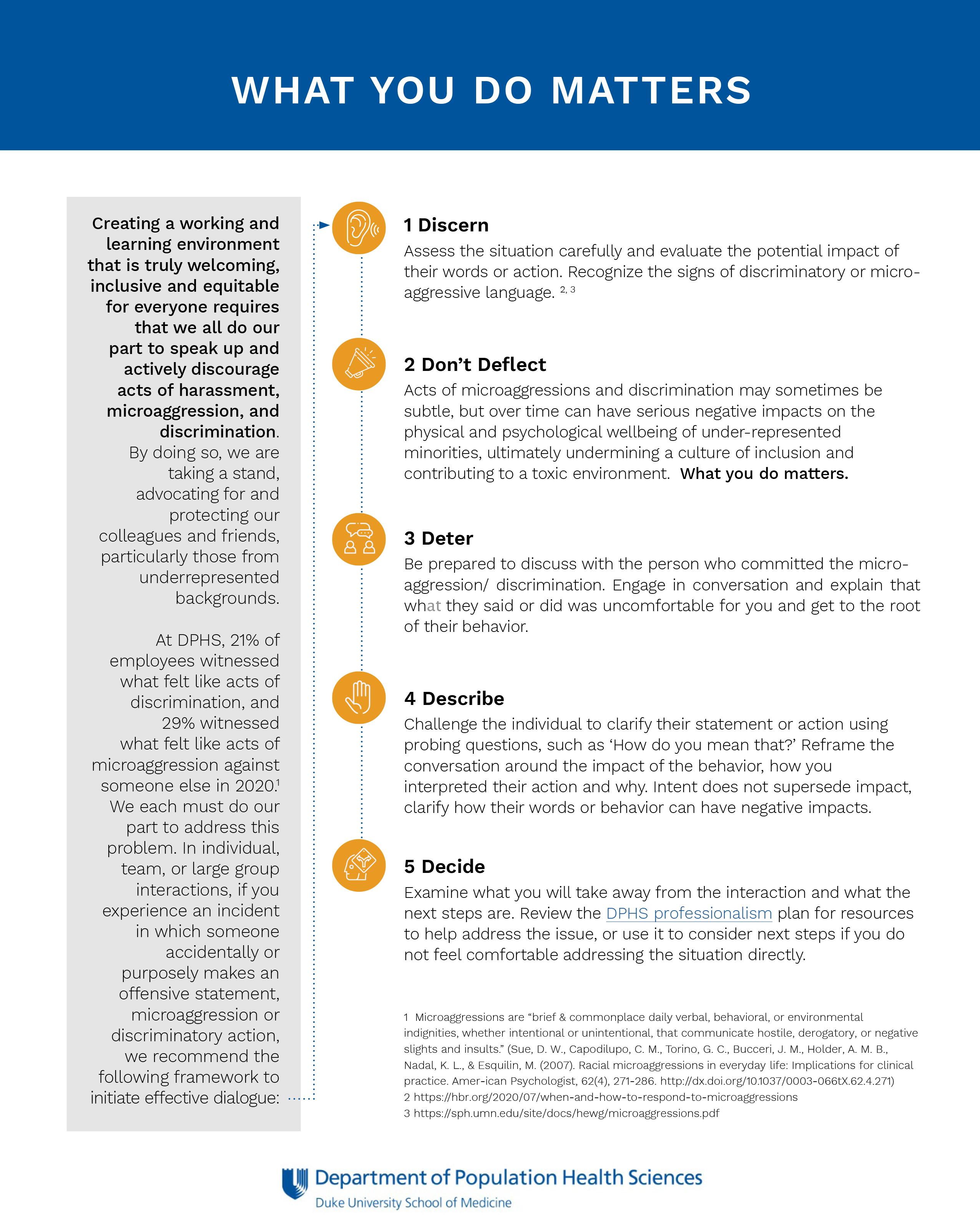
Our Commitment to an Inclusive Environment at the Department of Population Health Sciences
A. STATEMENT: The Department of Population Health Sciences (DPHS) is committed to maintaining an environment that is inclusive, diverse, and equitable. It is the commitment of the DPHS that racism, discrimination, and microaggressions will not be tolerated, and individuals engaged in this behavior will be subject to informal or formal processes. These may range from a conversation regarding unacceptable behavior, documented performance improvement plan, or a formal report to the Office of Institutional Equity.
B. SCOPE: All members of the DPHS community, including administrators, faculty, staff, postdoctoral fellows, graduate students, new recruits, and visiting scholars and students.
C. OBJECTIVES: Provide a supportive learning and working environment free from discrimination, microaggressions, or harassment based on race, color, religion, national origin, sex, age, social status, mental or physical disability, gender identity, or sexual orientation.
D. DEFINITIONS: Racism is prejudice, discrimination, or antagonism directed against a person or people on the basis of their membership of a particular racial or ethnic group. Discrimination is defined as disparate treatment of an adverse nature towards any member of our department based on race, color, religion, age, sex, national origin, social status, physical or mental disability, gender identity, or sexual orientation. Microaggression is defined as everyday slights, indignities, put-downs, and insults that members of marginalized groups experience in their day-to-day interactions with individuals who are often unaware that they have engaged in an offensive or demeaning way (Sue, 2010). Microaggressions are particularly insidious and common examples of racism, prejudice, or discrimination. Anyone in a marginalized group can experience microaggressions. Please examine the below table to view some examples of microaggressions. It is important that all DPHS members are aware of microaggressions and the detrimental effects they have on their victims. The most effective approach to addressing microaggressions is in dialogue directly with the related individuals.
E. RESPONSIBILITIES: Each member of our department is responsible for creating a workplace free of racism, harassment, discrimination or microaggression by exemplifying behavior that promotes positive interactions and by addressing behaviors that compromise our core values of diversity, equity, and inclusion. We must do our part to actively foster an inclusive and welcoming environment in our department. What we do matters.
F. REPORTING: Individuals who experience any racist, microaggressive or discriminatory incident within DPHS or needs support in initiating dialogue can:
- Directly contact the Vice-Chair of DEI, Tomi Akinyemiju (919- 613-5950 or tomi.akinyemiju@duke.edu), Staff Resource Person, Avalon McMullen (919-613-1846 or avalon.mcmullen@duke.edu), or Vice-Chair of Faculty Development, Karen Steinhauser (919-423-5684 or karen.steinhauser@duke.edu)
- Complete this form: Anonymous Form for the Reporting of Discriminatory Incidents in DPHS (submit form without your name to send email anonymously) reviewed by the Vice-Chair of DEI and Staff Resource Person. If needed, the Department will forward the incident to the Duke Office of Institutional Equity for official reporting and investigation. The Department encourages reporting of incidents from bystanders
- Contact the Office for Institutional Equity (OIE). All faculty, employees with teaching or supervisory authority, graduate students with teaching or supervisory authority, including TAs acting in their role, are required by the University to promptly consult with OIE, sharing known details of the incident of potential discrimination, harassment, or Title IX sexual misconduct, by telephone (919-864-8222), email or the OIE online reporting form. Please see the DPHS Professionalism Plan for more information on reporting structures (Appendix A).
Click on this link for more information on microaggressions. Adapted from: Sue, Capodilupo, Torino, Bucceri, Holder, Nadal, Esquilin (2007). Racial Microaggressions in Everyday Life: Implications for Clinical Practice. American Psychologist, 62, 4, 271-286

